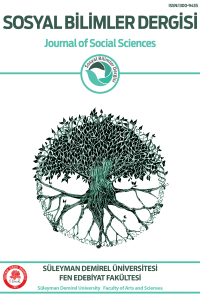Öz
Çin’in Wuhan kentinde başlayan ve hızla küresel bir pandemiye dönüşen COVID-19 salgını, bulaşıcı bir hastalık olarak dünya gündemine damgasını vurmuştur. Salgınla beraber ekonomiden sosyal yaşama dair birçok değişim yaşanmış ve salgın kapsamında çeşitli önlemler alınmıştır. Alınan tedbirler sonucu, salgının olumsuz etkilediği gruplardan biri de gençler olmuştur. Araştırma, COVID-19 salgını ve kısıtlamalarının üniversite öğrencilerinin yaşamları üzerindeki etkilerine odaklanmaktadır. Bu bağlamda üniversite öğrencilerinin sosyal hayatlarında, tüketim alışkanlıklarında, serbest zamanı kullanma biçimlerinde oluşan değişimler yanında, yüz yüze eğitimden uzaktan eğitim modeline geçişi nasıl deneyimledikleri, fiziksel hareketsizlik, sağlık sorunları ve bu sorunlarla baş etme süreçlerini gençlerin perspektifinden aktarmayı amaçlamaktadır. Öğrencilerin yaşadığı bu deneyimler sonucunda, geliştirdikleri baş etme pratikleri incelenerek, yaşanan sorunlara çözüm önerileri geliştirilmesi de amaçlanmıştır.
Çalışmada, İzmir Demokrasi Üniversitesinde eğitim gören öğrenciler arasından kolayda örnekleme tekniği kullanılarak seçilen 21 öğrenciyle yarı yapılandırılmış görüşme yapılmıştır. Elde edilen veriler betimsel analiz tekniğiyle analiz edilmiştir. Araştırmada, salgın sürecinde özgürlükleri kısıtlanan üniversite öğrencilerinin aile ilişkilerinin zedelendiği, sosyal ilişkilerinde tahammülsüzlükle baş ettikleri, serbest zaman kullanımlarında değişiklikler olduğu ve hasta olmaktan ziyade hastalık bulaştırma korkusu yaşadıkları sonuçlarına ulaşılmıştır. Araştırma sonuçlarından hareketle, benzer bir kriz durumunda gençlere zamanlarını daha iyi değerlendirebilecekleri ortamların sağlanmasının, gençlerin biyopsikososyal durumları üzerinde daha olumlu bir etki yaratacağı sonucuna ulaşılmıştır.
Anahtar Kelimeler
COVID-19 Üniversiteli gençler Sosyal ilişkiler Uzaktan eğitim Sağlık.
Kaynakça
- kaynakça ekleyiniz.
Öz
The COVID-19 epidemic, which emerged in Wuhan, China and quickly turned into a global pandemic, has left its mark on the world agenda as an infectious disease. With the epidemic, many changes have occurred from economy to social life and various comprehensive measures have been taken. As a result of the measures taken, one of the groups negatively affected by the epidemic was young people. The current study is to reveal the effects of the COVID-19 epidemic and restrictions on the experiences and lives of university students. In this context, it aims to convey the changes in social life and consumption habits of university students, the changes in the way they use their free time, as well as how they experience the transition from face-to-face education to the distance education model, physical inactivity, health problems and the processes of coping with problems from the perspective of young people. As a result of these experiences, the coping practices developed by the students were examined and it was also aimed to develop solutions to the problems experienced.
In the study, semi-structured interviews were conducted with 21 students selected from among the students studying at Izmir Democracy University using the convenience sampling technique. The data obtained was analyzed with the descriptive analysis technique. The results of the research revealed that university students, whose freedoms are restricted, have damaged family relations and cope with intolerance in their social relations, had changes in their use of leisure time, and had the fear of infecting loved ones than being sick. Based on the results of the research, it has been concluded that providing young people with environments where they can better use their time in a similar crisis will have a more positive effect on their biopsychosocial status.
Anahtar Kelimeler
COVID-19 University youth Social relations Distance education Health.
Kaynakça
- kaynakça ekleyiniz.
Ayrıntılar
| Birincil Dil | Türkçe |
|---|---|
| Konular | Sağlık Sosyolojisi |
| Bölüm | Sosyoloji |
| Yazarlar | |
| Erken Görünüm Tarihi | 28 Aralık 2023 |
| Yayımlanma Tarihi | 31 Aralık 2023 |
| Yayımlandığı Sayı | Yıl 2023 Sayı: 60 |
Kaynak Göster
Süleyman Demirel Üniversitesi Fen-Edebiyat Fakültesi Sosyal Bilimler Dergisi


